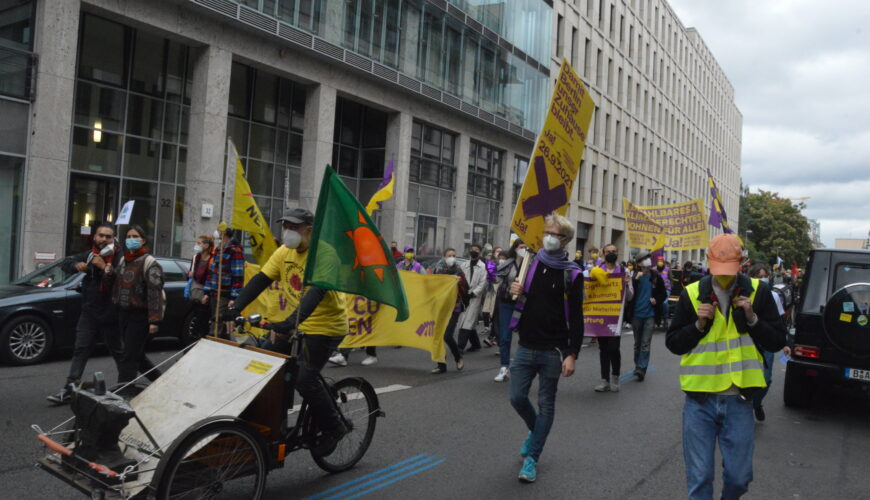All of us facing daily problems in housing and economic precarity are watching what happens next as Berlin paves the way
written by Nikos Vrantsis
edited by Rosemary Bechler
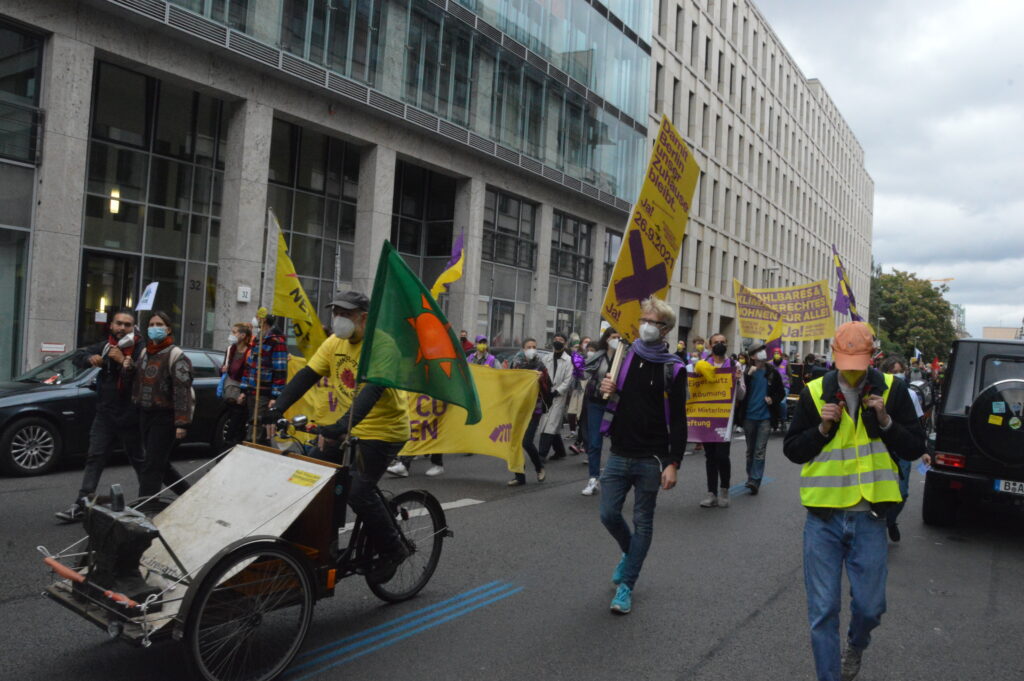
The question Berliners were asked to answer on the last Sunday in September was whether they were for or against the expropriation of the entire housing stock owned by companies with more than 3,000 apartments There are 12 big corporate landlords in total, each owning more than 3,000 homes each in the state of Berlin. The total number of properties to be expropriated is 240,000, all previously state-owned and privatized after 2000. 1.03 million people (56.4%) voted in favor and 715,000 (39%) voted against expropriation. The referendum is not binding on the government of Berlin. However, it will be difficult to ignore a request made from such a clear majority.
Contextualizing the referendum
In the mid-1990s, Berlin suffered a fiscal crisis, that was followed by the privatisation of the city’s state-owned housing stock. The sell-off that was justified as a way to ‘modernise’ the crumbling properties, led to an exponent increase in rents (even tenfold) with no physical improvement of the stock. In view of the housing cost overburden for tenants, in January 2019, the Berlin city government approved a five-year (2020-2025) rent-freeze, despite landlords’ fiery opposition and Angela Merkel’s federal government hostility. The new rent regulation (Mietendeckel), was passed in January 2020 and came into effect on 23 February 2020. However, in April 2021, Germany’s highest court ruled it unconstitutional and hence void. This triggered civic rage and the launch of the referendum campaign: against a coalition of speculative landlords and institutions expropriating housing en masse with the intention of increasing rental values (something that constitutes a form of enforced displacement) it was time for people to raise their voice.
The ownership structure of Berlin housing market
There are around two million apartments in Berlin. According to a report published by Rosa Luxembourg Stiftung in 2019
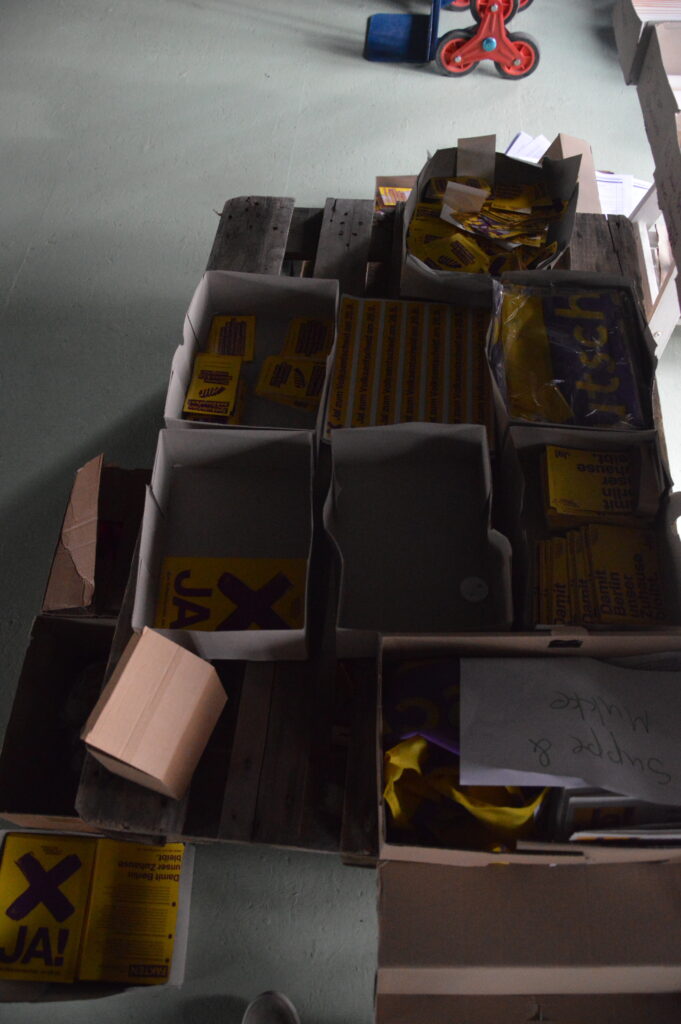
– 16,5% of the total stock belongs to financial market investors and listed housing companies,
– 25,1% is distributed among big private owners — either directly or through a company they control,
– 17% is distributed among ”small property owners”, meaning people and entities managing rental apartments as capital investment and private retirement provision. However, this estimation is quite opaque since it comes from an arbitrary analogy made for almost 300,000 privately owned rental apartments to 100,000 people from Germany and abroad who own a rental apartment in Berlin. But not all of them are actually «small investors” – there is hardly any reliable information on per capita units of housing per investor,
– 16% belongs to the State of Berlin, and in particular to the six state-owned housing companies (LWU), organised as private corporations owned solely by the State of Berlin. In principle, the managers work in a profit-oriented manner and their companies pay taxes. On the other hand, no profits have been distributed to the State of Berlin for many years and the State of Berlin can influence business policy via the supervisory boards and other bodies and regulations – and has been doing so since 2017, above all through the so-called cooperation agreement,
– 15,3% belongs to homeowners owning one or maximum two–properties – a very rare phenomenon in Berlin,
– 10% belongs to housing co-operatives. In Berlin there are almost 100 cooperatives with a little less than 200,000 apartments. Most of them have generated large surpluses in recent years thanks to low interest rates and rising rents and are investing them primarily in renovation and modernization, and in some cases in new buildings and acquisitions. Due to the long-term orientation and the mostly close ties to the tenants, rents only rise moderately. Another 20,000 homes belong to the church and charitable foundations – of which often very little is known as they don’t have to publish information about their finances and investment strategies.
It will be difficult to ignore a request made from such a clear majority.
Who are the corporate landlords of Berlin?
Investment funds, banks, insurance companies and other professional financial market players invest primarily in commercial real estate around the world. In Berlin they are also active in the housing market. Another specialty of Berlin with rapidly growing importance, are large listed housing companies such as Deutsche Wohnen SE, which often started out as investment funds themselves and are still mostly owned by professional financial market players. The total number of properties owned by corporate landlords are 240,000, all privatized after 2000. These corporate landlords are:
- Deutsche Wohnen SE, was founded in 1998 as an investment vehicle by Deutsche Bank and took over large housing stocks from Gehag, BauBeCon and GSW and now owns a stock of 111.500.
- Vonovia, is the largest housing company in Germany and possibly Europe, and now owns a stock of 44.000 in Berlin.
- The Adler Group which was created in 2020 through the merger of ADO Properties AS, which specialised in Berlin, and Adler Real Estate AG which is active throughout Germany, and owns a stock of 22.200.
- Covivio SE, a real estate company listed on the Paris Stock Exchange and invests in businesses (hotels, offices, etc) and apartments primarily in Paris, Milan and Berlin, own a stock of 15.700 in Berlin.
- Akelius Residential Property, a company the majority of which is owned by a foundation in the Bahamas. It has a stock of 13.700.
- TAG Real Estate AG with a stock of 9.900.
- Grand City Properties AS, with a stock of 8.000.
- BGP group with a stock of 8.000.
- Ηilfswerk- Siedlung Gmbh with a stock of 6.000.
- Pears Global Real Estate, owned by the three Pears brothers, with a stock of 6.000 in Berlin, managed through two companies each on the British Virgin Islands and Cyprus.
- Heimstaden with a stock of 5.500.
- DIV German asset and real estate management with a stock of 3.800.
On Monday, a day after the referendum, Akelius signed its total Berlin portfolio of 13.700 properties to Heimstaden. But there was another bigger trade-off…
The Vonovia & Deutsche Wohnen deal
On that same day, news channels reported that Vonovia, the second largest player in the local housing market acquired the majority stake in Deutsche Wohnen stock, in a buy-up in defiance of the referendum results.
Vonovia’s owner Rolf Buch stated: «In view of these great challenges, Berlin cannot stand still like this for years. This sort of thing will happen because the new Senate will now be called upon to draft a new law on expropriation but also because of the clear constitutional concerns raised.»
The purchase took place for two main reasons. First, Vonovia estimates that the expropriation will not be implemented anyway. Second, it hopes that if the State is to socialize properties, it will do so at market prices, and such a transaction would be highly profitable.
However, if the State buys these houses at market prices, it will violate the essence of the referendum, which explicitly refers to expropriation of the stock at prices lower than those on the market.
The absence of a demanding tenants’ union
85% of the total population in Berlin lives on rent, yet there is not a single, mature and active tenant union to provide the organizing needed for a long-lasting struggle against corporate landlords, speculation and inadequate housing conditions.
Berliner Mietverein or BMV (Berlin Tenants’ Association), was formed in 1888, and numbers 180,000 members, but is more like a service provider for legal assistance to tenants than a tenants’ union. As a response to this toothless outfit, MGB (Tenants’ Union of Berlin) was created in 2020. MGB has a more militant structure and a fourfold purpose: (i) creating a long-term base for organizing, (ii) testing new ways of contending housing defects such as direct action and rent strikes, (ii) safeguarding tenants’ rights but also tenant agency and (iii) sharing knowledge for the purpose of self-empowerment of the tenants. MGB seeks more radical action. But there is still a long way to go.
Vote share
The message of the campaign was clearly left-wing and progressive. Central districts, Kreuzberg and Friedrichshain, where the movement is strong gave an overwhelming vote in favour of expropriation.
Marzhan, a working-class neighborhood of the east side that is a stronghold of the far-right AfD, also voted in favour, in a class-based vote. There were only two districts in which the ballot gave a majority against expropriation: Steglitz-Zehlendorf, the wealthiest neighbourhood of Berlin and the well-off Reinickendorf, both with high-levels of homeownership in the tenure mix, together with strongholds of the conservative CDU. In these three areas the campaign had a problem penetrating.
The referendum… explicitly refers to expropriation of the stock at prices lower than those on the market.
| Area | Seats | Referendum | |
| Yes | No | ||
| middle | GREEN (5 seats) SPD (2 seats) |
95,681 (63.7%) | 47,948 (31.9%) |
| Friedrichshain-Kreuzberg | GREEN (5 SEATS)
DIE LINKE (1 SEAT) |
95.207 (72.4%) | 31,632 (24%) |
| Pankow | GREEN (5 SEATS)
SPD (3 SEATS) |
134,339 (60,8%) | 78.261 (35.4%) |
| Charlottenburg-Wilmersdorf | SPD (3 SEATS)
GREEN (2 SEATS) CDU (2 SEATS) |
83,422 (50,1%) | 75.263(45,2%) |
| Spandau | SPD (3 SEATS)
CDU (2 SEATS) |
57,563 (51,9) | 47,610 (42.9%) |
| Steglitz-Zehlendorf | CDU (5 SEATS)
SPD (1 SEAT) GREENS (1 SEAT) |
77,237 (44%) | 89,452 (51%) |
| Tempelhof-Schöneberg | GREEN (3 SEATS)
SPD (2 SEATS) CDU (2 SEAT) |
93,887 (53,4%) | 73,656 (41,9%) |
| Neukölln | SPD (4 SEATS)
GREEN (2 SEATS) |
84,749 (60,7%) | 47,063 (33,7%) |
| Treptow-Köpenick | SPD (5 SEATS)
DIE LINKE (1 SEAT) |
91,431 (58,5%) | 58,722 (37.6%) |
| Marzahn-Hellersdorf | CDU (3 SEATS)
AFD (2 SEATS) DIE LINKE (1 SEAT) |
75,410 (55,8%) | 53,244 (39,4%) |
| Lichtenberg | DIE LINKE (3 SEATS)
CDU (2 SEATS) SPD (1 SEAT) |
88.032 (60,9%) | 50.260 (34,8%) |
| Reinickendorf | CDU (4 SEATS) SPD (2 SEATS) |
57,751 (45,1%) | 62.103 (48,5%) |
A social movement or political organization?
The campaign was diverse in its composition yet impeccably organized. The main organizing body, primarily charged with resource management (coming from voluntary contributions), ensured access to decision-making for all participating members. The main executing bodies were organized at neighbourhood level, divided into sub-groups (for legal support, awareness raising, collective participation etc.). The whole campaign was not geared around large-scale, central protests but into local, decentralized actions, organized by grassroots action groups.
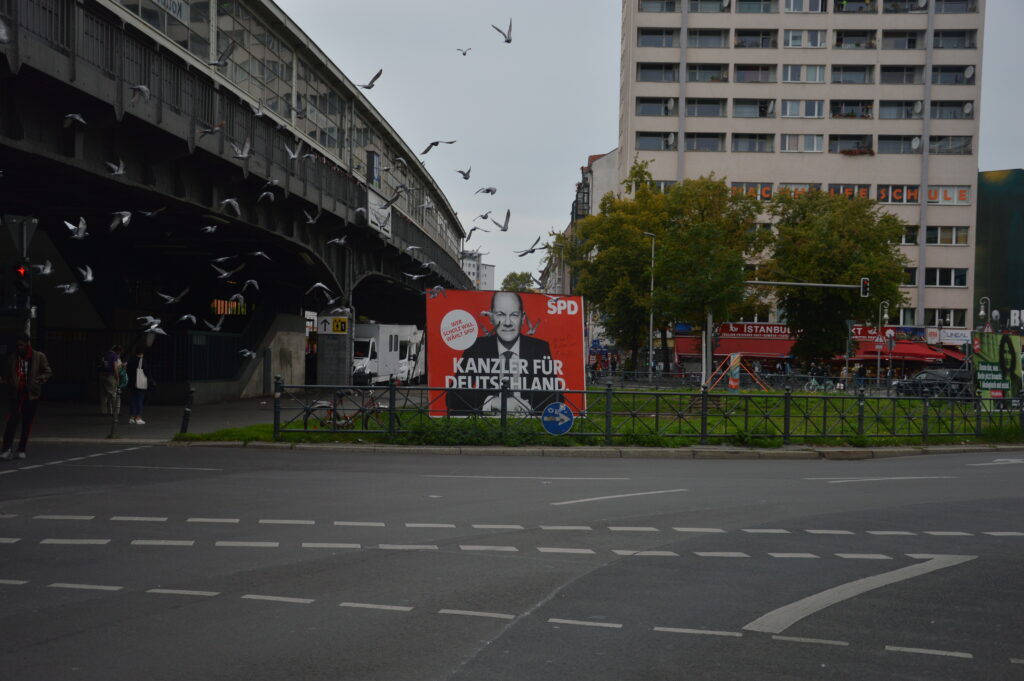
The difficult areas dominated by suspicion of the new left and marked by a strong far-right presence such as Marzahn, were tackled by militant segments of the campaign who charged themselves with the difficult task of fitting in and helping raise local awareness. For example, activist groups from the guaranteed «pro-referendum» Friedrichschain, made it their job to fill in information gaps with their field actions in Marzahn.
It remains uncertain whether and to what extent this social movement can turn into an institutional structure able to secure longer-term demands. Will it be able to continue pushing for the realization of the expropriation if the government decides to bypass or alter the decision.
Whose vote?
Those not having German citizenship, i.e. immigrants, were excluded from voting. The population slice excluded from voting is whopping, given that one third of Berlin’s population is either a migrant or of migrant origin. According to estimations, one fourth of the total population was excluded from the ballot. This partly explains why despite the high turnout in real numbers, it still remained low considering the fact that 85% of the total population of the city are tenants. Many of those tenants, many of them of migrant origin, gasterbeiters (”guest workers”), living in investment-starved, dilapidated housing, simply had no right to vote. However, the ”right to the city” group, emerging from the Berliner Starthilfe project has tried to include migrants in the campaign. Insisting that they cannot speak on behalf of all migrant groups in Berlin, nevertheless they represent migrant experiences in accessing housing and thereby introduce some welcome diversity into the over-representation of the German, middle class, predominantly white population that makes up the bulk of the campaign.
When is expropriation expropriation?
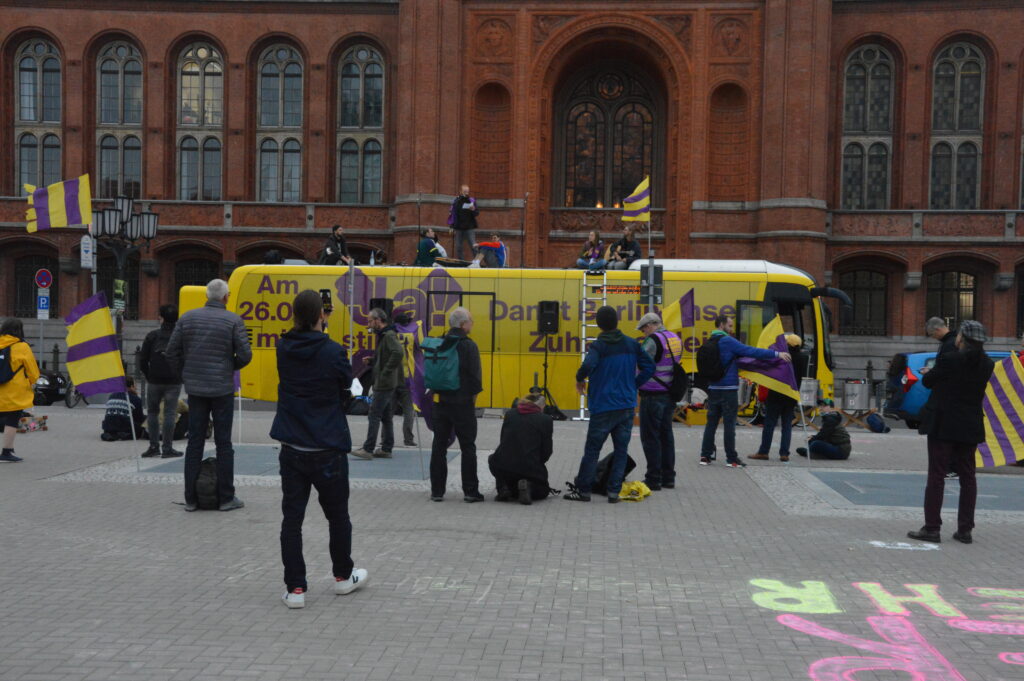
Prior to the referendum, the government of Berlin, led by the Social Democrats, bought an estimate of 15,000 homes back from Deutsche Wohnen. Although some media sources covered this as a victory of the people and as a retreat of the government, the real reason for the buy-off was different. First and foremost, this purchase turned into a key argument for the government against the referendum, suggesting that it was unnecessary, since political representatives were already doing their job, socializing properties. Second, the State bought these properties back at market prices, even though their condition was worse than it was before their initial privatization. This is not expropriation, but a State intervention in favour of big capital. Greeted on all sides by the media, politicians and citizens as a victory for the people, this was merely the State facilitating housing speculation among corporate landlords and international capital.
The campaign for its part, clearly spells out the meaning of expropriation (enteignen) and specifically Article 15 of the constitution, according to which «Land… may be transferred to common property… for social purposes.» Several committees in both the Bundestag (Federal Parliament) and the State Senate confirm that the expropriation request is legally valid and compatible with the constitution. Hence, if this request for expropriation is followed to the letter and to the spirit, companies will still be compensated but at a price lower than the market prices.
The counter-arguments
The main arguments of those opposing expropriation – that is CDU (Christian Democrats), SPD (Social Democrats) and FDP (liberals) – are twofold. One is that expropriation means the resurgence of communist totalitarianism. In a similar line of thought another version of the argument goes that it would be bad for Berlin’s image to send international investors a message that the state is expropriating property. According to this argument – after housing, comes transport, electricity networks, Deutsche Telecom, etc. Secondly it is argued that given the demands of the expropriation campaign, the genossenschaften (housing co-ops) will be expropriated. The campaign insists however that cooperatives operate on the basis of the principles of public interest. They prove that adequate housing can be offered at low prices and therefore must be excluded from any expropriation.
Who’s going to do the expropriating?
This is fairly complex. The referendum did not come together with a pre-crafted proposed legislation on behalf of the campaign. In 2014, a similar law was put on the ballot but was discredited in judicial terms thus leading to the cancellation of the whole campaign. This time the organizers preferred not to put the law on the ballot, to avoid jeopardizing the realization of the referendum. Hence, the government of the State of Berlin is responsible for turning the referendum into law. By doing this it will have to set the costs of compensation of the corporate landlords and then decide on which entity is to manage the socialized housing stock.
Both at state and at federal level, the SPD holds the majority. However, it cannot govern alone. The composition of the new government, whether it is conservative or progressive, will play a key role. According to the activists, the expropriation law can be ready by the spring of 2022 and the expropriation will cost between 9 and 10 billion euros.
Bezirk tools and other pressure points
Many activists have pinned their hopes on the Bezirk, the community councils that played a key role in preventing evictions and controlling rental prices. Bezirk, nominating leftists and activists, usually have the strongest tenants’ protection because of two key tools of defence:
– the Vorkaufsrecht, that is the right of first denial, which gives the Bezirk the opportunity to buy a property when it goes on sale, before the landlord has the right to sell it to a third party,
– the Milieuschutzgebiet, which means that in the poorest areas with larger swathes of people in need of social protection, the conversion of a tenure into property (mainly the conversion of rented houses into privately owned properties) cannot take place without the approval of the Bezirk.
But the campaigners have defence enough. Their intention is to push for the expropriation to be implemented, and their focus is geared towards the district level and local representatives to enforce the popular will in parliament. If their local representatives or the government try to bypass them, they will suggest a new ballot, this time including their 21-page long legislative proposal. In that case a vote in favour means the ballot turns directly into state law, bypassing the parliament altogether.
What does the referendum result mean to housing activists everywhere?
The decision of Berliners to expropriate corporate landlords will surely be a point of reference for housing movements everywhere. The housing crisis is raging worldwide. Since the financial collapse of 2008 housing precarity is eating its way into the social core of societies, unsettling even those defining themselves as part of the middle class who were previously protected by the alleged robustness of their housing system. Now these too are collapsing under the pressure of financialization and speculation of different sorts.
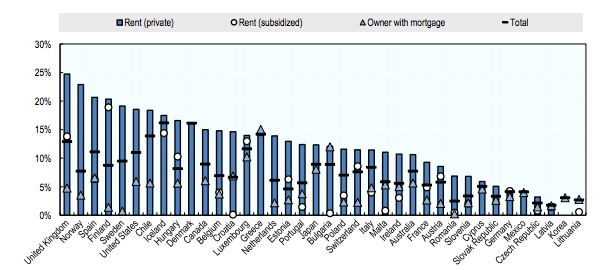
Even in contexts and housing systems different from Berlin, creating a social demand for universal access to adequate and dignified housing is crucial for all of us facing daily problems related to housing and economic insecurity. Berlin is paving the way. And the world is watching.

